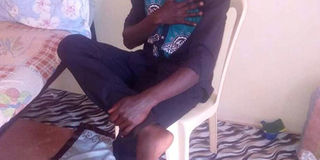Premium
Concern over rising number of university student deaths

Ivy Wangechi, a sixth-year student at Moi University, was killed by an assailant outside Moi Teaching and Referral Hospital in Eldoret on April 9, 2019. COURTESY
When the lifeless body of Victor Kimurei, a student at Laikipia University was found lying in the middle of the Nyahururu-Nakuru Highway two weeks ago, the varsity’s administration, the police and his fellow students could not agree on what had killed him.
The fourth year Bachelor of Education student had a deep injury on the back of his head. The police said he had been hit by a vehicle which sped away.
The university’s Deputy Vice-Chancellor- Academic Research, Wanjiku Chiuri, said the student had fallen from a moving vehicle while going to his room located outside the campus.
“Investigation had revealed that the student got into a fatal accident when he hanged onto a moving lorry and unfortunately slipped off and hit the tarmac,” said Prof Chiuri.
The students, however, claimed that Mr Kimurei had been killed during a robbery and it gave them a reason to protest. For almost a whole day, the area surrounding the otherwise quiet university was a no-go zone as police and students engaged in endless battles.
Mr Kimurei, who would have turned 24 next month, died in circumstances that have become too familiar in the public university education system today. Unable to get accommodation inside campus, the student was forced to live with his colleagues in a rented hostel in the nearby Nyumba Tatu area. He eventually paid for it with his life.
While universities are supposed to guarantee the safety of students placed in their hands by parents, who are spending a fortune so that their children can have a better life in future, this protection starts and ends at the gate.

Ivy Wangechi, a sixth-year student at Moi University, was killed by an assailant outside Moi Teaching and Referral Hospital in Eldoret on April 9, 2019. COURTESY
Since the government decided in 2009 to increase university enrolment by unpegging it from available bed space, the number of students has continued to soar. The challenge of providing reliable and safe accommodation for scholars has grown in tandem with it.
Several public universities have made it a policy to only guarantee accommodation inside their campuses for first years only. The rest of the students have to fight for the remaining hostel spaces or seek accommodation outside the institution.
In just 10 years since then President Mwai Kibaki said it would be a government policy to admit as many students as possible in public universities, slums and low class neighbourhoods have mushroomed around the institutions where students can get alternative housing.
The self-sponsored module and the directive issued in 2011 instructing all universities to implement a double intake has also played a major role in the current shortage of accommodation in the universities. And with little funding from the government, universities have been forced to make a choice between investing in teaching or building hostels.
Today with about 800,000 students currently enrolled in Kenyan universities, there are about 280,000 bed spaces according to various statistics. This has created a dire situation. At Kenyatta University, students who are unable to get campus accommodation live at Kahawa Sukari, Roysambu, Ruiru and Kahawa Wendani estates, if they can afford it. Those who cannot afford it live in the informal and crime-infested Kilometre 101, or simply KM.

Caleb Kiplangat, a first-year student at Technical University of Kenya. His body was washed ashore in Kisauni, Mombasa. COURTESY
At Jomo Kenyatta University of Agriculture and Technology (Jkuat) those who can’t get accommodation in campus live in dilapidated dwellings in Juja town, Gashororo and Weitethie. In Narok, Maasai Mara University students live in hostels spread across the town.
In Nyahururu’s Laikipia University, students who can’t get campus accommodation have been forced to live at the neighbouring Karuga, Losogwa and Nyumba Tatu areas.
And in Kakamega’s Masinde Muliro University of Science and Technology, those who cannot live on campus seek accommodation in places like Lurambi, Koromatangi, Kefinko or Maraba, which are all low income neighbourhoods where security is not guaranteed.
Yet each year, more and more parents are desperately sending their children to live in these ratchet neighbourhoods not knowing if they will come back home alive at the end of the semester. The result of this lack of reliable housing for students is now coming back to haunt the government, 10 years later.
Today, hardly a month passes without a university student getting murdered while on the way to school from their place of stay, or when getting back home. Several others get robbed.
The country only gets to know of this insecurity when students protest the deaths of their colleagues or when it becomes too insecure.
Last weekend, Maseno University joined the growing list of institutions whose students have gone on strike due to insecurity.
Last month, Jkuat and Technical University of Mombasa went on the rampage to complain about insecurity in areas surrounding the institutions.

Dennis Kimutai, a third-year student at Egerton University, went missing on December 4, 2019. COURTESY
In October, Moi University students also protested for the same reason. Their strike preceded another one by Masinde Muliro university students in September.
In the Maseno strike last weekend, the students were complaining of an incident where two female students were raped in a house located on the third floor of a building outside the institution.
It was one of the many incidents of insecurity that have been witnessed at the institution over the years, in what is believed to be a conspiracy executed by some students working closely with locals.
We have deployed Administration Police officers inside and outside our institution"
Around the same time, a 23-year-old Kisii University student was gang raped by boda boda riders. The student, who was due for graduation this Friday, had boarded a motorcycle late in the night hoping to be taken to where she stays but ended up in the rider’s house.
Kisii University Students Association president Kennedy Chemase says it is unfortunate that the student underwent such an ordeal, adding that it would not have happened if she had accommodation on campus.
“Those in the campus hostels are secure because Administration Police officers are on patrol day and night,” he says.
Kisii County police boss Martin Kibet says there has not been any major security threat due to the measures they have put in place.
“We have deployed Administration Police officers inside and outside our institution. They patrol the area for 24 hours and deal with any possible security threats on time. This is in addition to the security personnel employed by the university,” says Mr Kibet, adding that they work hand in hand with the university.

Victor Kimurei, a fourth-year student at Laikipia University. His body was found lying in the middle of the Nakuru-Nyahururu highway with a deep head injury on November 30, 2019.
At Ramogi Institute of Advanced Technology in Kisumu, one student was killed in August. Mr Harrison Omondi was dragged out of his off-campus hostel at night and clobbered using crude weapons.
He died on the spot. Since the murder, students were warned against staying out beyond 7:30pm. Another student at the institution was raped and seriously injured this semester.
“All the incidents happened between 7:30pm-10pm in the evening. Police have turned a blind eye on the insecurity situation,” says student leader Ian Mbati/
At Masinde Muliro, several students have been killed in insecurity related incidents since the beginning of the year.
Students continue to be targeted by gangs that kill, main and steal laptops, phones and other valuables.
Those who don’t co-operate end up with serious injuries or at the morgue.
We will engage every avenue to bring these life-threatening cases to a permanent end"
Mr Clement Omollo Ogendo, an Information Technology student at the university, was in September attacked and killed by suspected bodaboda operators in his rented house at Koromatangi Estate.
His body was recovered by students the following morning with severe head injuries on a roadside at Lurambi shopping centre.
According to the institution’s management, over five cases of students being attacked were reported in the past six months, with many cases going unreported.
The university’s acting academic registrar, Thomas Sakwa, says the management of the institution had put up a students-community-university management committee to engage all stakeholders to seal insecurity gaps.
Kakamega County police boss Bernard Muli says the police are working closely with the university management to find solutions to the menace.
“We will engage every avenue to bring these life-threatening cases to a permanent end. It must end,” he says.
MOMBASA ATTACK
Eight hundred kilometres away in Mombasa, Vincent Ochieng was recently turned away when he went to get a replacement for his identity card after he faced difficulties in placing his fingerprints during the process.
He needed a new ID as the one he had was among the items stolen from him when he was attacked by machete-wielding criminals in Kisauni, Mombasa.
“My right hand has formed a C-shape because of the injuries I suffered. It has been difficult even to write notes in class and sit exams as I cannot write well,” says Mr Ochieng’ a TUM student.
Mr Ochieng’, 21, was among four students from the institutions who were attacked and seriously injured in November by notorious gang members in Kisauni.
The attack saw one of them, Evance Munene, admitted to the Intensive Care Unit (ICU) of Coast General Hospital. He is now recovering at home.
Other students who have been attacked in recent months include Golden Adhiambo, a student at Kenya Coast National Polytechnic, who was stabbed six times by criminals in Mishomoroni area of Kisauni in October, a few days after the killing of Kiplangat.
In June, two other students from Technical University were also attacked by criminal gang members.
One student, identified as David Mwaura, a fourth year at the Faculty of Applied and Health Science, was stabbed four times by criminals in Hongera, Kisauni, and died.

